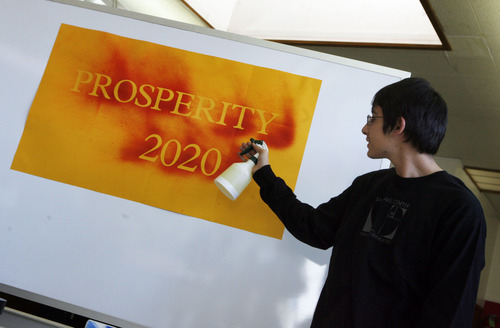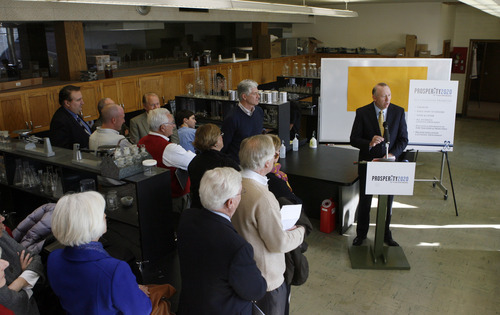This is an archived article that was published on sltrib.com in 2011, and information in the article may be outdated. It is provided only for personal research purposes and may not be reprinted.
Performance pay for teachers, more college scholarships, and ACT exams for all 11th-graders are among more than a dozen items Utah's business leaders want to see lawmakers fund this legislative session.
Those items are part of a proposal unveiled on Thursday by Prosperity 2020, a Utah business-led movement to invest in education that includes 15 chambers of commerce, among other partners. In all, the group wants to see lawmakers put an additional $128 million toward public schools and higher education in Utah. That amounts to roughly a third of the projected $400 million in additional revenue the state is expecting.
Each year, a number of groups makes education recommendations to the Legislature, but business leaders said this is the first time the business community has presented its own specific, comprehensive proposal to improve education in Utah.
"This proposal is a sound investment in our future," said Mark Bouchard, chairman of Prosperity 2020 and a senior managing director at CB Richard Ellis. He noted it's in the interest of the business community to support schools. "It's a sound investment in our kids, our grandchildren and the future leaders of our state."
The group is also asking for $50 million to fund an additional 12,479 students expected in Utah schools next year; $10 million for higher education enrollment growth; $2 million to improve educator evaluations; $10 million to go toward early education programs; and $23 million to help implement new academic standards known as the Common Core as well as computer-adaptive school testing, among other things.
Bouchard said none of the proposals would require a tax increase.
And it appears many lawmakers and education leaders are on the same page.
The Education Interim Committee has already voted to support bills that would spread college readiness tests such as the ACT and computer-adaptive testing statewide. And Sen. Aaron Osmond, R-South Jordan, is already working on a bill to revise teacher employment laws and possibly implement performance pay.
Also, the state school board shares a number of priorities with the business community, including funding enrollment growth, implementing a college-readiness test for high schoolers, and implementing the Common Core and adaptive testing. The state board has also lent support to the idea of revising the state's current laws on teacher employment, which also is part of the Prosperity 2020 proposal.
Several lawmakers turned out to the group's unveiling Thursday to show support for some or all of the Prosperity 2020 recommendations. Rep. David Clark, R-Santa Clara, said he supports all the proposals though he noted there are a number of other programs in the state also crying for additional funding.
"Certainly what they outlined here today is worthy of part of that revenue growth," Clark said. "I would like to see a majority of this receive funding next year while we look to build on that in years to come."
Sen. Pat Jones, assistant minority whip, said she also believes the proposals have merit.
Rep. Joel Briscoe, D-Salt Lake City, said he favors many of the group's goals and proposals and is excited to see the business community talking about education. But Briscoe, a former teacher, said he takes issue with performance pay for teachers. He said though business leaders may find they can increase something like retail sales, for example, by paying employees for performance, that doesn't necessarily apply to teachers who educate as many as hundreds of individual students with different needs each day.
He also said research doesn't support performance pay as a way to improve student performance, citing a recent three-year study on performance pay for teachers conducted by the National Center of Performance Incentives at Vanderbilt University's Peabody College. The study found that a bonus-pay system in metro-Nashville schools had no impact on student achievement.
"I'm willing to vote for merit pay as soon as they show it benefits students," Briscoe said. "I'm willing to vote for a lot of these things as soon as someone shows me the research."
Bouchard said the business community hopes to work with lawmakers to design the specifics of any performance pay system, which he said the private sector believes, as a fundamental principle, can improve performance.
lschencker@sltrib.com Twitter: @lschencker







